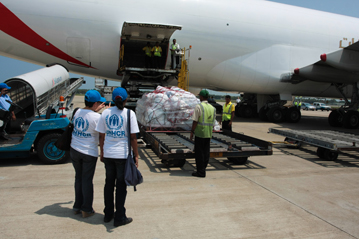Feature: Refugees adrift in Africa's Great Lakes region
Feature: Refugees adrift in Africa's Great Lakes region

CISHEMEYE, Burundi (UNHCR) - Life has come full circle for Benoit Harerimana. Born in the Democratic Republic of the Congo (DRC, formerly Zaire) to Burundian refugee parents, Benoit now finds himself a refugee in Burundi.
After his parents fled civil war in Burundi in 1972, the family settled in the south Kivu area of eastern Congo, an area that erupted last October with fighting between two rebel groups - RCD-Goma which controls most of the region, and Mai-Mai fighters. Waves of refugees have been arriving ever since at UNHCR refugee reception centres in north-western Burundi - an estimated 10,000 since October.
The fate of Harerimana - and possibly thousands like him - underlines the instability of life in the Great Lakes region of Africa. While tens of thousands of Burundians have been refugees in neighbouring countries for up to three decades now, their homeland is welcoming the return of many who claim Burundian origins, while simultaneously becoming a land of asylum for Congolese.

Harerimana and his heavily-pregnant wife, Espérance Vumi, trekked on foot from their home in Lubilizi, DRC, to the shores of the Rusizi river where, like thousands others, they risked their lives swimming across because Congolese authorities would not let them leave at normal border crossing points. They paid a strong swimmer to pull Vumi across the river to Burundi, using a plastic jerry can as a flotation device. Two days later, at this transit camp in Cishemeye, north-western Burundi, she gave birth to a healthy baby girl.
"If we could get some land here in Burundi, we would stay here," says Harerimana, whose parents are also in the transit camp. "We don't want to go back to the Congo." Vumi, nursing her tiny baby, says simply, "I will follow my husband wherever he goes."
Destin Kadoyi, a 19-year-old orphaned by the war in DRC, has a similar story. "My parents told me I was Burundian, from Kirundo province," he says, though he was born in eastern DRC after his parents fled their homeland in 1972.
"We stayed in Congo as refugees, just watching developments in this region," he says. Weeks turned into decades, and then his parents were killed during fighting in DRC in 1996. With the renewed fighting in the last few months, "I felt I would be better off in my home country," said Kadoyi. So he joined the exodus to Burundi earlier this month, and is now temporarily at home in UNHCR's Gatumba transit centre, just 3 km from the DRC border.
"I simply would like to live in Burundi," he says. "With the help of UNHCR, I hope to move from here and to resume my studies." He was a student at a technical commercial school in the DRC.
Of the 1,279 refugees registered in Gatumba, 538 are actually Burundians who had been refugees in DRC, says Benoit Hamenyimana, UNHCR field assistant in the camp. Some of them have been outside Burundi since 1972; others since the genocide of 1994. "Perhaps 100 of them are what we call 'sans terre', people who have no land to call their own," he adds.
Many are children who lost their parents in Congo and don't know where their relatives are in Burundi. UNHCR is working urgently with Burundian authorities to reunite these children with relatives, no matter how distant, and move them out of the transit centre. For the other "sans terre", the refugee agency has funded a government survey to identify and demarcate all available government land, with an eye to providing land to these people as well as dispossessed Burundians.
For Philemon Bapfakulera, a 47-year-old father of four now in the Rugombo reception centre (first stop for many refugees fleeing DRC), this is the second time in his life he has been a refugee in this area. The first time was in 1960, when he was just five years old, and his parents fled fighting in their native Zaire. "I never imagined I would have to come here again," he said. "We thought things would remain peaceful over there."

A successful tailor back in DRC, Bapfakulera now sews in the reception centre on a borrowed sewing machine, and says he earns just 1,500 to 2,000 Burundian francs (less than $2) a month, only enough to buy a tiny luxury item like a bar of soap for his family. Forlornly he contemplates the foreseeable future as a refugee. "No one knows when peace will come back home," he says, returning to stitching a colourful dress.
By Bernard Ntwari and Kitty McKinsey
UNHCR Bujumbura









